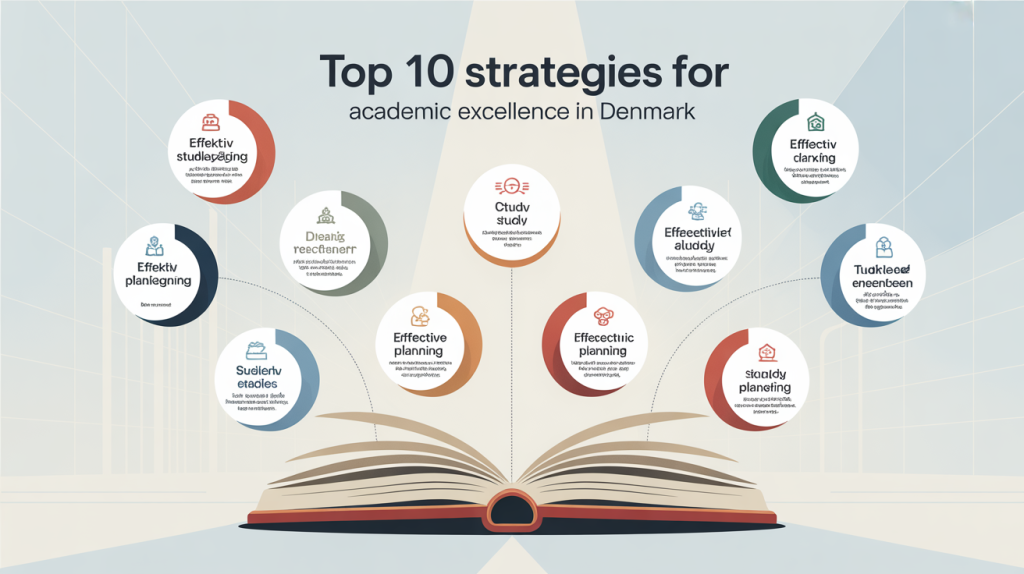Top 10 Strategies for Academic Excellence in Denmark’s Competitive Environment
Quick Navigation
- 1. Embrace Problem-Based and Active Learning
- 2. Master Academic Writing and Communication
- 3. Use Diverse and Effective Study Techniques
- 4. Develop Strong Time Management Skills
- 5. Leverage Support Services
- 6. Actively Participate in Teamwork and Collaboration
- 7. Seek and Apply Feedback
- 8. Pursue Internships and Real-World Learning Opportunities
- 9. Maintain Well-Being and Address Personal Challenges
- 10. Cultivate Adaptability and Lifelong Learning
- Conclusion
- Take the Next Step
1. Embrace Problem-Based and Active Learning
In Denmark, education is often centered around problem-based learning (PBL). This method encourages students to apply their theoretical knowledge to real-world issues. To succeed in this environment, students should:
- Participate actively in discussions.
- Challenge existing ideas and engage in debates.
- Explore experimental approaches to learning.
Engaging with the material in this proactive manner can significantly enhance understanding and retention, positioning students for academic excellence.
2. Master Academic Writing and Communication
Effective communication is a critical component of success in higher education. In Denmark, students are expected to produce clear, original, and well-cited work. To improve academic writing skills, consider:
- Attending workshops or seeking help from tutors on academic writing.
- Focusing on logical argumentation in assignments.
- Familiarizing yourself with citation styles commonly used in your discipline.
Improving your writing skills not only helps achieve better grades but also fosters clearer communication in collaborative projects.
3. Use Diverse and Effective Study Techniques
Every student learns differently, and it is essential to explore various study methods to discover what works best for you. Here are some effective techniques:
- Break study sessions into shorter, focused blocks to enhance retention.
- Utilize active learning techniques such as summarizing information or teaching peers.
- Incorporate a mix of visual, auditory, and kinesthetic learning styles.
Experimenting with different study methods can help combat fatigue and improve overall academic performance.
4. Develop Strong Time Management Skills
Time management is crucial for balancing academic responsibilities and personal life. Successful students often employ strategies such as:
- Utilizing calendars or task management apps to keep track of assignments and deadlines.
- Planning workloads to ensure a balanced approach to studies and extracurricular activities.
- Setting realistic schedules for reading, research, and assignments.
Effective time management allows for a more organized study routine and reduces stress.
5. Leverage Support Services
Danish universities provide extensive support services for students, including academic tutoring and writing centers. Students should take advantage of these resources, especially when facing academic difficulties. Early engagement with support services can lead to:
- Tailored guidance that addresses specific challenges.
- Greater confidence in academic abilities.
- Enhanced understanding of course material.
Utilizing available support can make a significant difference in your academic journey.
6. Actively Participate in Teamwork and Collaboration
Collaboration is a cornerstone of the Danish educational system. Many courses require group projects and collective problem-solving. To excel in collaborative settings:
- Be open to sharing ideas and feedback.
- Inspire and motivate team members to achieve shared academic goals.
- Learn to resolve conflicts and manage different opinions constructively.
Being a proactive team member can lead to more successful project outcomes and enhance your learning experience.
7. Seek and Apply Feedback
Constructive feedback is invaluable in academic growth. Regularly seeking input from professors and peers encourages:
- Continuous improvement in study methods and assignment quality.
- The ability to understand different perspectives and integrate feedback into future work.
- Recognition of your own strengths and areas for development.
Actively applying feedback enhances academic performance and develops critical thinking skills.
8. Pursue Internships and Real-World Learning Opportunities
Gaining practical experience is highly valued in Danish education. Students are encouraged to pursue internships or real-world projects that complement their academic studies. Benefits include:
- Exposure to industry practices that enhance academic knowledge.
- Opportunities to apply theoretical concepts in practical settings.
- Building professional networks that can aid future career prospects.
Participating in internships equips students with essential skills and knowledge necessary for their career paths.
9. Maintain Well-Being and Address Personal Challenges
Academic excellence is intertwined with overall well-being. To thrive academically, students should prioritize their mental and emotional health by:
- Seeking help when facing personal challenges, including stress and anxiety.
- Engaging in self-care practices that promote a work-life balance.
- Utilizing university resources such as counseling services to navigate personal difficulties.
Fostering well-being can lead to a more sustainable academic performance.
10. Cultivate Adaptability and Lifelong Learning
The Danish educational system encourages a culture of lifelong learning and adaptability. To thrive in this dynamic environment, students should:
- Stay open to new learning experiences and challenges.
- Be willing to adapt their study strategies as necessary.
- Continuously seek opportunities to upgrade their skills and knowledge.
By embracing adaptability, students not only enhance their academic achievements but also prepare themselves for the evolving demands of the global job market.
Conclusion
Academic excellence in Denmark is achievable for both international and domestic students who adopt proactive and effective strategies. From leveraging support services to engaging in collaborative learning environments, these strategies are vital for flourishing in Denmark’s competitive educational landscape.
At Study in Denmark, we are dedicated to supporting students in their educational journey. Our platform connects international students with Danish universities and provides resources to navigate the complexities of studying abroad. If you are interested in learning more about our services or exploring partnerships, we invite you to contact us today. Let’s work together to empower the next generation of global learners in Denmark.
Take the Next Step with Study in Denmark
Explore further the opportunities that await you in Denmark’s education system:



